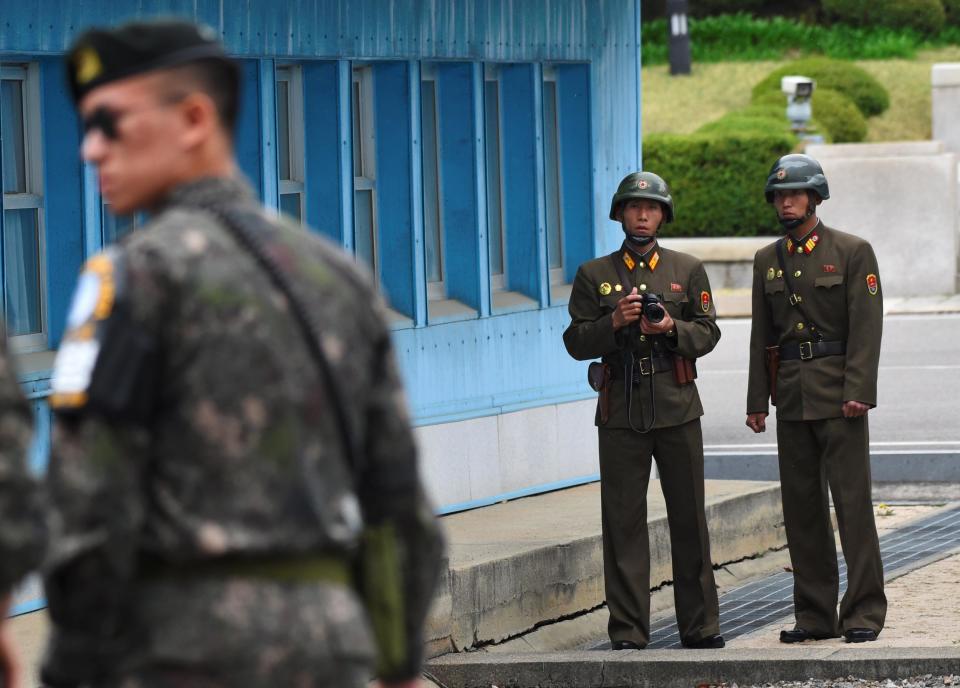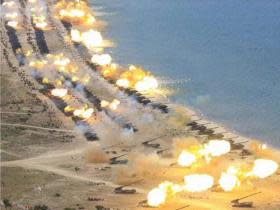Donald Trump's administration aims to counter 'urgent threat' of North Korea attack by tightening sanctions
Donald Trump's administration has said it will tighten sanctions against North Korea as it aims to quell rising fears that Pyongyang will launch a nuclear attack.
All 100 members of the Senate arrived at the White House for a briefing by Secretary of Defence Jim Mattis, Secretary of State Rex Tillerson, and Director of National Intelligence Dan Coats, who maintained that Washington will "remain open to negotiations" but also prepared to defend the US and its allies. Mr Trump attended the meeting for approximately five minutes.
The mass invitation is an unusual move on the part of the Trump administration, and Senator Chris Coons called the briefing "sobering".
Read more
North Korea shows military might in pictures of biggest drill ever
The Democrat told reporters after the White House briefing that military options were discussed.
“It was a sobering briefing in which it was clear just how much thought and planning was going into preparing military options, if called for, and a diplomatic strategy that strikes me as clear-eyed and well proportioned,” Mr Coons said.
A statement from the Trump administration said: “The President's approach aims to pressure North Korea into dismantling its nuclear, ballistic missile, and proliferation programmes by tightening economic sanctions and pursuing diplomatic measures with our allies and regional partners."
“The United States seeks stability and the peaceful denuclearisation of the Korean peninsula. We remain open to negotiations towards that goal. However, we remain prepared to defend ourselves and our allies.”
Members of Congress have been seeking a clear White House strategy following repeated North Korean missile tests and fears that it could conduct a sixth nuclear bomb test.
While the administration has said repeatedly that military strikes remain an option, officials have stressed that tougher sanctions are more likely given the risks of massive North Korean retaliation.
To that end, North Korea's United Nations mission said in a statement that it will "surely win a victory in the death-defying struggle against the US imperialists".
Democratic Senator Ben Cardin said there is no “pretty military solution” to North Korea. He said Mr Trump sending aircraft carriers to the region “just heightens the temperature".
However, the top US commander in the Pacific, Admiral Harry Harris, disagrees - although he said his goal was to bring the North Korean regime "to [its] senses, not to [its] knees".
Admiral Harris said that though the US missile defence system will protect Hawaii, it could be overwhelmed in an attack from North Korea.
He proposed increasing missile “interceptors” in Alaska and increasing radars and capabilities in Hawaii and possibly along the west coast of the US.
He added - during a Congressional meeting - that deploying American warships to waters around the Korean Peninsula and aerial exercises with bombers will also “ameliorate [North Korean leader] Kim Jong-un's worst impulses".
US forces are also conducting other exercises with the Japanese and South Korean militaries in an effort to discourage North Korean action, but also prepare for it.
China's special representative for Korean Peninsula affairs, Wu Dawei, held talks on Wednesday with his Japanese counterpart, Kenji Kanasugi, amid rising tensions and speculation that North Korea may soon carry out another nuclear or missile test.
Mr Wu said the two sides also agreed on the importance of using peaceful means in resolving the problem. He said China opposes “war and unrest” on the Korean Peninsula.
A US missile defence system - called the Terminal High-Altitude Area Defence (THAAD) system - is being installed in South Korea and will be operational “in the coming days".
The system is designed to shoot down approaching ballistic missiles, which are a threat since Seoul, South Korea and its 10 million inhabitants are within striking distance of North Korea.
North Korea is not the only country in the region to be angered by the THAAD, with the work to set up the system having angered China and Russia who see the system's powerful radars as a security threat.
Admiral Harris also said that the USS Carl Vinson aircraft carrier sent to the Sea of Japan is ready and able to defend any North Korean attack, adding “if it flies it will die".


